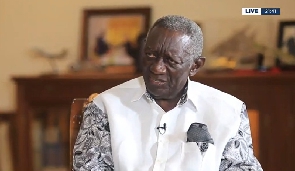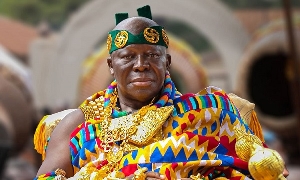Opinions of Monday, 5 April 2010
Columnist: Okoampa-Ahoofe, Kwame
Nkrumah was Himself a Talented Opportunist!
By Kwame Okoampa-Ahoofe, Jr., Ph.D.
As usual, I hardly expected much that was edifying from the government-owned Ghanaian “Spectator” newspaper editorial captioned “Cheapening Nkrumah’s Name and Image” (See Modernghana.com 3/14/10). Under the guise of seeking to preserve the memory and dignity of Ghana’s first postcolonial premier, the apparently self-centered Spectator editorialist – the rather pontifical writer kept using the first-person pronoun “I” – launched an unpardonably gratuitous tirade against some Ghanaian entrepreneurs whose sole crime appeared to be the fact that they had characteristically taken advantage of the centenary birthday anniversary of Mr. Kwame Nkrumah to profitably promote their wares.
One company, for instance, had reportedly “doctored [the print copy] of the statue of Nkrumah at the Nkrumah Mausoleum to show [the late dictator] holding a cup of their beverage.” The Spectator editorialist could also have been honest enough to point out that the bulk of the projects launched and/or executed by Nkrumah’s Convention People’s Party (CPP), and over which his sympathizers and disciples wield ineffable bragging rights to this day, were initiated with funds realized from the sweat and toil of the Ghanaian cocoa farmer. In brief, there is absolutely nothing amiss with a cocoa-beverage producing company promoting Ghana’s staple cash crop with the image of the man who financially exploited our cocoa farmers more than any other Ghanaian leader after his tenure.
And then, also, an unnamed banking institution which was, nonetheless, singled out for caustic caviling because its administrators had dared to link its cross-border reach with Nkrumaist pan-Africanism, was bizarrely faulted for “cheapening” the name of the Nkroful Show Boy, because “Bank Anonymous” had also presumed to sacrilegiously appropriate the name of Mr. Nkrumah to boost the subscription of its depositors. For the Spectator editorialist, therefore, the foregoing represent the most damning examples of entrepreneurial opportunism, conveniently either forgetting or shamelessly ignoring the glaring fact that Dr. J. B. Danquah and the other seminal members of the United Gold Coast Convention (UGCC), Ghana’s premiere anti-colonialist organization, had equally and plausibly envisaged the future Prime Minister Nkrumah as a “genius opportunist” and traitor of unremitting and unpardonable proportions.
The Spectator editorialist further laments the fact that virtually no books authored by Mr. Nkrumah had been reprinted and made available for sale during the year-long centenary celebration of the birth of Ghana’s at once most celebrated and maligned dictator. Here, rather than blaming Ghanaian traders and other entrepreneurs for failing to work out a deal with Mr. Nkrumah’s publishers, the indeflectible blame ought to rather be laid at the doorstep of the Mills-Mahama government of the so-called National Democratic Congress (NDC), a regime that rather facilely conflates cheap Nkrumaist rhetoric with actuality. And to think that President John Mills sat in the wings of political gamesmanship for 8 years haranguing and lambasting the Kufuor-led and Danquah-leaning New Patriotic Party (NPP) for annually according short-shrift treatment to Nkrumah’s memory and symbolic significance makes one really wonder just who the real enemies of “The Osagyefo” are!
In any case, we almost forgot to mention for the benefit of our readers, particularly the youthful ones who are prone to unreflectively lapping up the tawdry rhetoric of the Nkrumacrats, that President Nkrumah was, like this writer, largely a self-published author, with most of his books being published by a London-based company called PANAF PRESS. Legend has it that shortly upon assuming the premiership of Ghana, Nkrumah gave a substantial sum of our country’s hard-earned currency, foreign exchange, I suppose, to a Briton for the express purpose of establishing the PANAF PRESS.
At any rate, it is Nkrumah’s own children, the presumable holders of copyright privileges to their father’s books, who ought to have ensured that their patriarch’s books would be made readily available to the newest set of Ghanaians citizens. On the whole, however, it decently appears that the present generation of Ghanaian youths are more pragmatically concerned with meticulously and wisely focusing on the development of our nation’s economy and culture, rather than quixotically presuming to carry the torch of a collective African destiny for a continent whose disparate levels of national agendas necessitate that charity, of course, begin at home.
*Kwame Okoampa-Ahoofe, Jr., Ph.D., is Associate Professor of English, Journalism and Creative Writing at Nassau Community College of the State University of New York, Garden City. He is a Governing Board Member of the Accra-based Danquah Institute (DI), the pro-democracy governance think tank, and the author of 21 books, including “Ghanaian Politics Today” (Atumpan Publications/Lulu.com, 2008). E-mail: okoampaahoofe@optimum.net.
###












